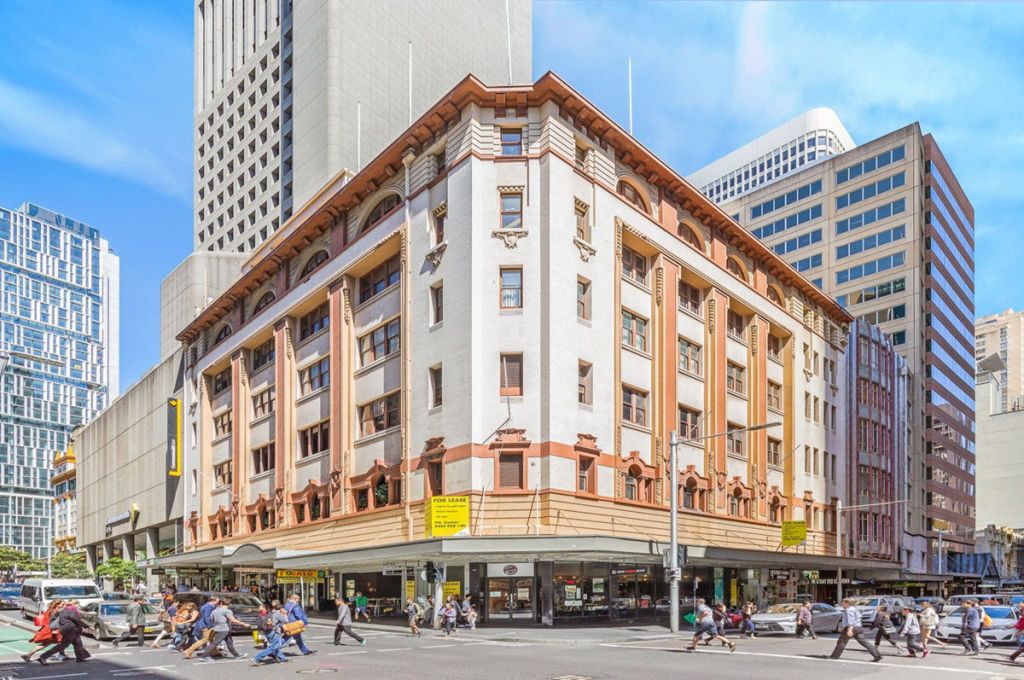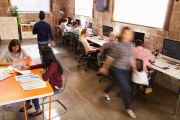
Basement hotel proposed for former Snow's Emporium building in Sydney
Sydney’s hotel market is so tight that one hotelier is converting a vacant basement in a landmark CBD building into a “boutique hotel”.
I-Nap Management has submitted plans to the City of Sydney for a 38-room hotel that is completely underground.
The basement space at the seven-storey, heritage-listed former Snow’s Emporium building, on the corner of Liverpool and Pitt streets, takes up 668 square metres of gross floor area and has been disused for about a year.
It was previously used as various karaoke bars over the past 10 years, with the 13 karaoke rooms and dance floor still intact.
I-Nap has proposed to convert the space into six single-person rooms, 19 “small” two-person rooms and 12 “large” two-person rooms, as well as one disabled accessible room.
The standard hotel rooms would range from between about seven to eight square metres – about half the size of a regular car parking space.
The rooms will be prefabricated and brought to the site, where they will then be assembled and connected to the appropriate services.
Rooms will have private bathrooms, while communal spaces include a sitting area, computer room and laundry facilities.
The estimated cost of the project is $875,000, excluding the cost of the prefabricated rooms. I-Nap could not be contacted for comment in time for publication.
Angus Ryals, owner of Ryals Hotels, lodged a development application – which is still awaiting the council’s decision – in 2018 to build 100 self-contained capsule “pods” in the basement of his hotel in Sydney’s Broadway.
Sydney’s eye-watering land values had given rise to the growing idea of niche accommodation such as his and I-Nap’s proposed hotel, he believes.
“The tight hotel market in Sydney has caused property prices to be extremely high. For that reason I think operators are attempting to re-invent the wheel in an effort to maximise returns,” he said.
“The beauty of this particular development is that it is using ‘secondary space’, meaning the applicant is able to build value out of a more affordable space.”
High hotel rates in Sydney have also encouraged hotel groups to look outside the box and address customer concerns around price by providing smaller hotel rooms.
“I think your average customer is very concerned about price and these types of ideas are a way for an operator to turn a lower-star property, which simply doesn’t have the facilities of a towering skyscraper in the city, into a cool experience,” Mr Ryals said.
“If you’re in Sydney for a couple of nights working all day, you just need somewhere to sleep. In that case the room needs to be nice, tidy and clean but the reception doesn’t need to be amazing and you don’t need people juggling or spitting fire.”
But Mr Ryals believes that it will take some time for people to become comfortable with the idea of alternative hotels and smaller rooms before trying them.
“I still think there is space for your normal hotels, whatever the star rating because people generally like to have a no-fuss consistent experience.”
Tourism Accommodation Australia NSW and national chief executive officer Michael Johnson said I-Nap’s hotel project shows how spaces are being put to different uses to get the best value in a crowded city centre.
“Doing a hotel development underground in Sydney is certainly different – with a unique selling point – normally a space like this would be used as a carpark!”
“The development is also ‘on trend’ with the move towards lifestyle brands and the boutique, funky look which is particularly attractive to the millennial market.”
Mr Johnson said “an unprecedented collection” of new niche hotel brands at all levels of the hotel industry had emerged in the past decade.
“Never before has the Australian hotel industry seen such cutting-edge innovation that is not only meeting changing travel trends, but anticipating them as well.”
He added that the development phase will peak in the next three years in major cities across the country.










